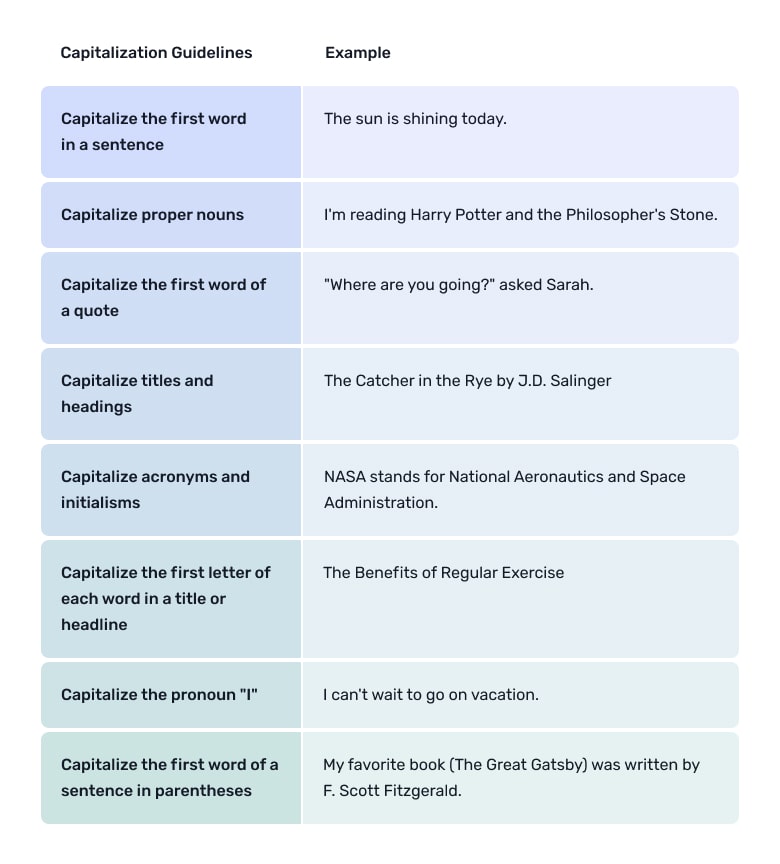Capitalization
Capitalization is an important aspect of written communication that often goes overlooked. However, incorrect capitalization can change the meaning of a sentence and confuse readers.
In this article, we will discuss the basic rules of capitalization that every student should know.
Capitalize the first word in a sentence
The first word of every sentence should be capitalized. This is a basic rule of capitalization that you should always follow.
Example: The quick brown fox jumped over the lazy dog.
Capitalize proper nouns
Proper nouns refer to specific people, places, or things and should always be capitalized. This includes names of individuals, businesses, organizations, geographic locations, and specific events.
Example: Maria went to the Eiffel Tower in Paris, France, for her birthday.
Capitalize the first word of a quote
When writing dialogue, the first word of a quote should be capitalized.
Example: “I can’t believe it,” said Tom.
Capitalize titles and headings
When writing titles and headings, capitalize the first word and any other important words, such as nouns, pronouns, adjectives, verbs, and adverbs. However, conjunctions, prepositions, and articles should not be capitalized unless they are the first or last words in the title.
Example: The Great Gatsby by F. Scott Fitzgerald
Capitalize acronyms and initialisms
Acronyms and initialisms should be capitalized. This is especially important when using abbreviations for organizations or names.
Example: The United Nations is often referred to as the UN.
Capitalize the first letter of each word in a title or headline
When writing titles or headlines, it is common to capitalize the first letter of each word.
Example: Top 10 Tips for Writing a Successful Essay
Capitalize the pronoun “I”
The pronoun “I” should always be capitalized, regardless of its position in a sentence.
Example: I went to the store to buy some milk.
Capitalize the first word of a sentence in parentheses
If you have a sentence within parentheses, the first word should be capitalized.
Example: Maria (who is my cousin) went to the Eiffel Tower in Paris, France for her birthday.

Some Extra Tips on Capitalization
- Capitalize the names of days, months, and holidays. For example: Monday, February, Christmas.
- Capitalize the names of specific historical events or periods. For example: World War II, the Renaissance.
- Capitalize the names of languages and nationalities. For example: Spanish, French, American.
- Capitalize the first word of a salutation or closing in a letter or email. For example: Dear Mr. Johnson, Sincerely yours.
- Capitalize the first word of a bullet point or numbered list item. For example: 1. Buy milk, 2. Wash the car.
- Capitalize the first letter of a word that is used as a proper noun or a brand name, even if it wouldn’t normally be capitalized. For example: iPod, Kleenex.
- Capitalize the first letter of a word that is being used in a special or technical sense, even if it wouldn’t normally be capitalized. For example: the Internet, the Big Bang.
- When referring to God in a religious context, the pronouns He, Him, and His should be capitalized.
- Capitalize the first letter of a word that begins a direct question in the middle of a sentence. For example: “Do you know where the library is?” she asked.
By following these basic rules of capitalization, you can ensure that your writing is clear, concise, and easy to read. Remember, correct capitalization is an important part of effective written communication, and it’s never too late to start improving your writing skills.